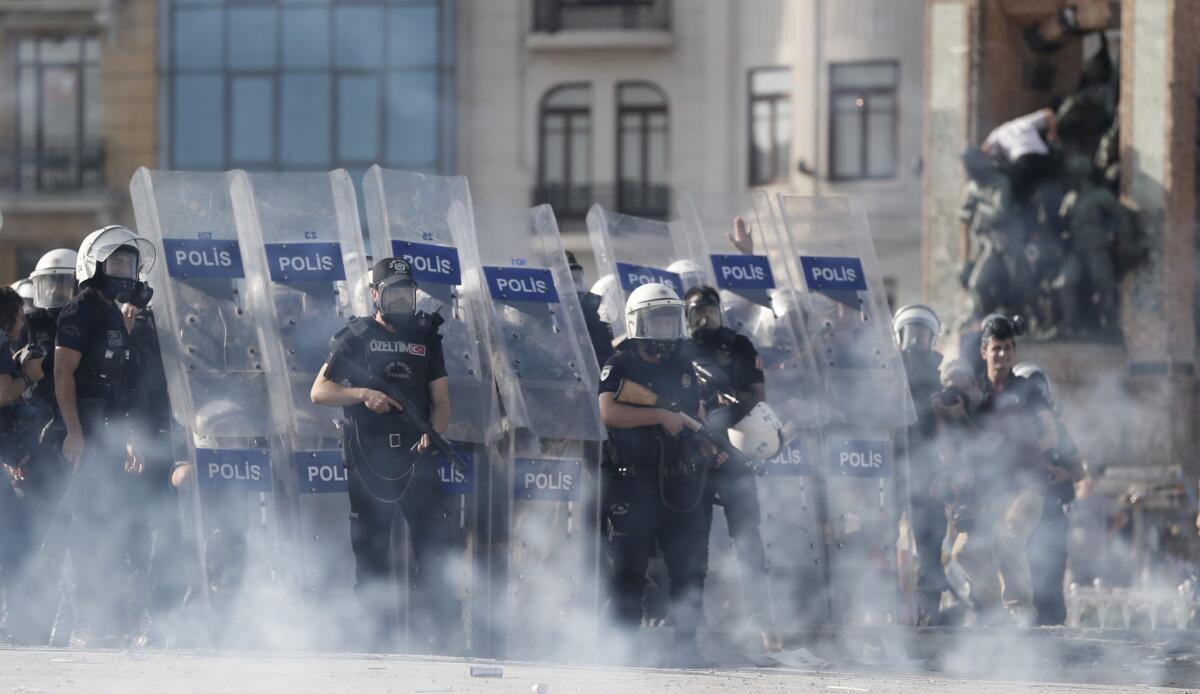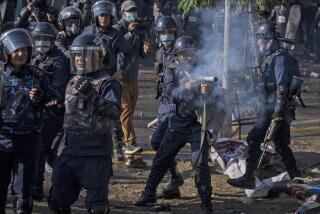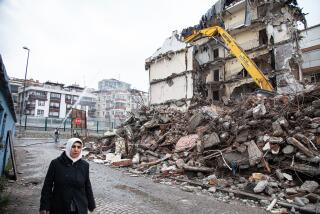Police storm Istanbul square, clash with protesters

ISTANBUL, Turkey -- Turkish police used tear gas and water cannons to disperse protesters adorned in gas masks and slinging Molotov cocktails in central Taksim Square early Tuesday. The clashes marked the first major violence in the iconic square since scores of anti-government protesters occupied it more than a week ago.
Early-morning commuters scurried into cafes on the fringes of the square -- where they were offered lemon cubes to mitigate the effects of the tear gas -- as hundreds of police officers backed by armored vehicles moved past barricades and into the area. Security forces fired volleys of tear gas and tore down posters that hung above the square.
“Our aim is to remove the signs and pictures on Ataturk statue and the Ataturk Cultural Centre. We have no other aim,” Istanbul Gov. Huseyin Avni Mutlu wrote on Twitter, according to reports in the Turkish media. “Gezi Park and Taksim will not be touched.”
PHOTOS: Unrest in Turkey continues
A splinter group of protesters hurled Molotov cocktails and shot fireworks at police officers. By midday, police controlled the side streets and boulevards adjacent to Taksim Square, a space at the heart of Istanbul with a long history of political protest.
“It was provocation,” said one female protester, who asked to be referred to as Deniz A., standing in nearby Gezi Park early Tuesday afternoon as tear gas hung in the air. “They want clashes with us, then they can portray us as the aggressors.”
The dawn raid came after several days of calm in the square in which protests -- initially demonstrations against the planned destruction of Gezi Park that morphed into an anti-government movement after a police crackdown -- began to resemble a festival, with reggae bands playing in the center of the area and thousands of young people camping out, eating, drinking and dancing.
Protesters have been made up mostly of middle-class youth, born after the political violence that swept Turkey in the 1970s and largely unaffiliated with any political party. Instead, they represent a fiercely nationalistic and secular current and feel threatened by what they see as Prime Minister Recep Tayyip Erdogan’s authoritarianism and the ruling Justice and Development Party’s increasing focus on Islamic strictures.
Violence has regularly flared in other cities throughout the country, notably in Izmir and the capital, Ankara. Two protesters and one police officer have died in violence over the last nearly two weeks. A doctors union has reported more than 4,000 injured.
Police claimed that Tuesday’s operation was staged to remove posters, but some people have said that the raid signaled a more forceful effort to quell protests -- despite reports that negotiations between the Justice and Development Party, known as AKP, and representatives of the Gezi Park movement are due to commence.
On Sunday, Erdogan gave fiery speeches at six rallies across the country, scuttling hopes that he would strike a more conciliatory note. Despite scrapping plans to build a shopping mall in the park, he has shown few signs of relenting to protester demands. He insists that development in the area will go ahead, suggesting that a mosque or an opera house may also be built.
“How can you attack my police? There are those who side with those swearing against the prime minister of this country. We are going to show patience, but patience has a limit as well,” the Hurriyet Daily News quoted Erdogan as saying.
Senior AKP representatives have previously struck more sympathetic notes.
“The government is playing good cop, bad cop,” said Bilgesu Ilgar, a student camped out in Gezi Park. “We need a completely new government. We cannot trust the AKP.”
The AKP is planning to to stage counter-rallies in Ankara and Istanbul later this week to marshal its support base.
Erdogan is expected to meet with representatives from the Gezi Park protests on Wednesday.
ALSO:
Judge sentences six extremists in British bomb plot
South Africa’s president to visit ailing Nelson Mandela
Suicide bombers target central Damascus, killing at least 14
Johnson is a special correspondent for The Times.
More to Read
Sign up for Essential California
The most important California stories and recommendations in your inbox every morning.
You may occasionally receive promotional content from the Los Angeles Times.










